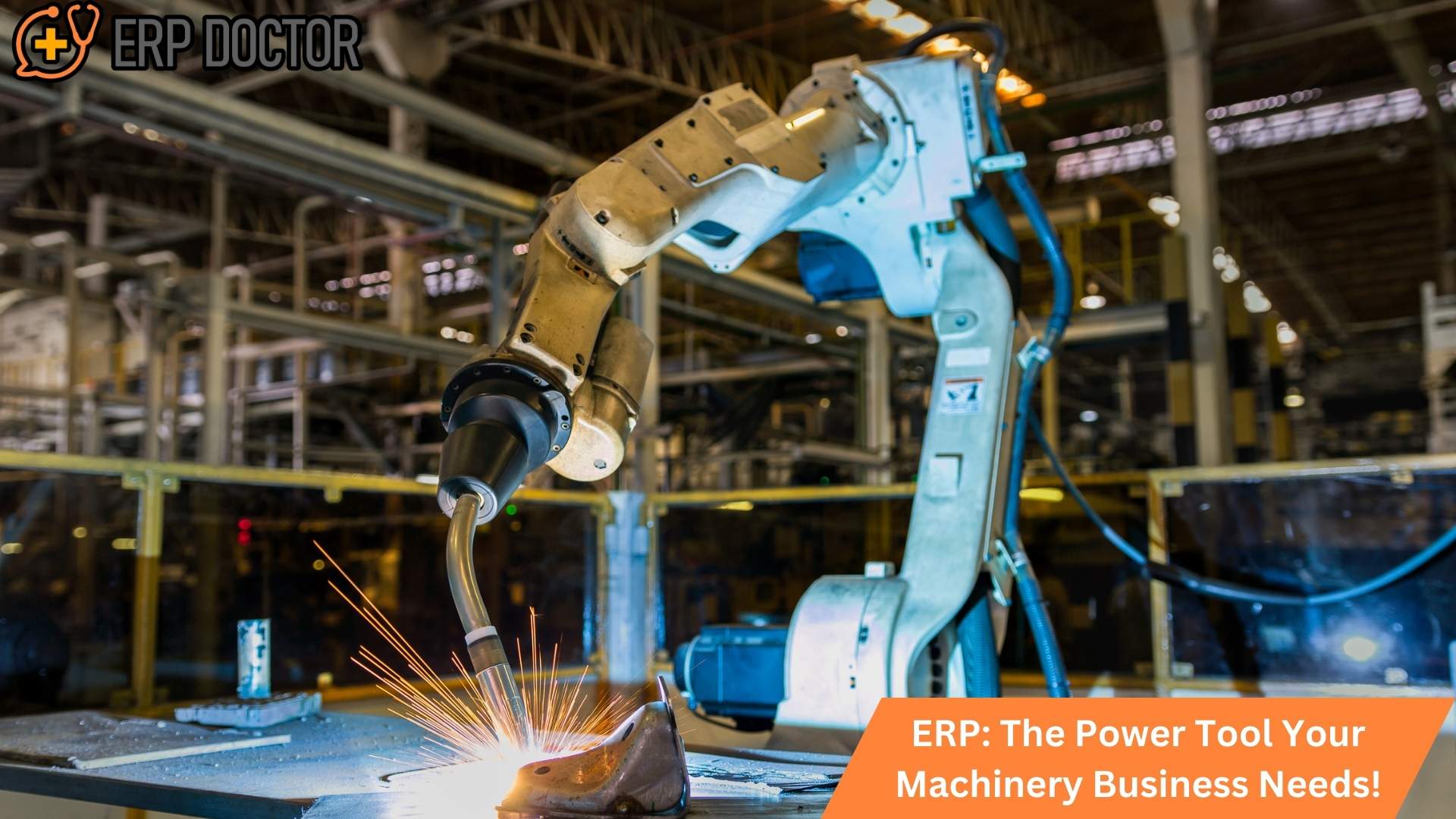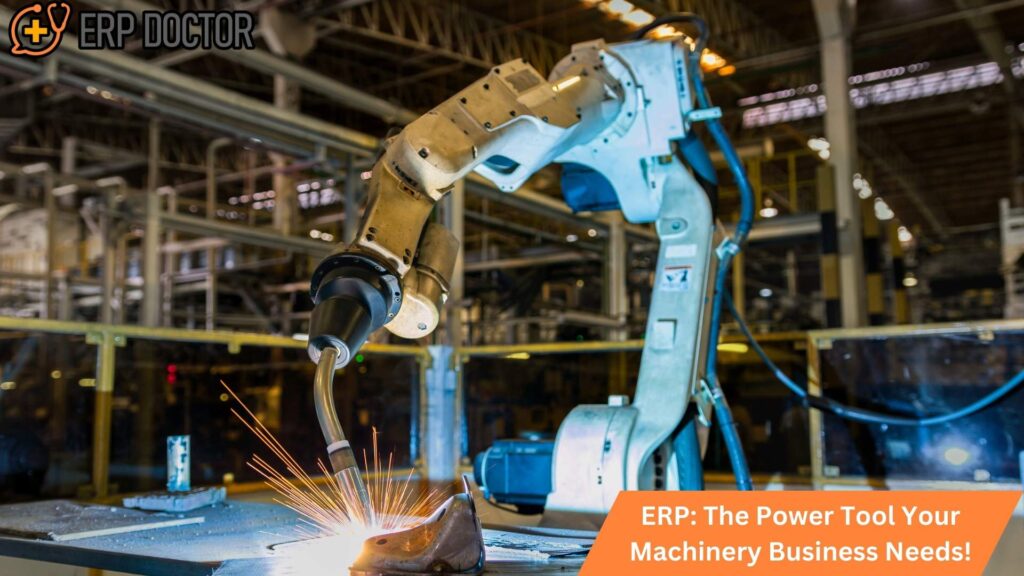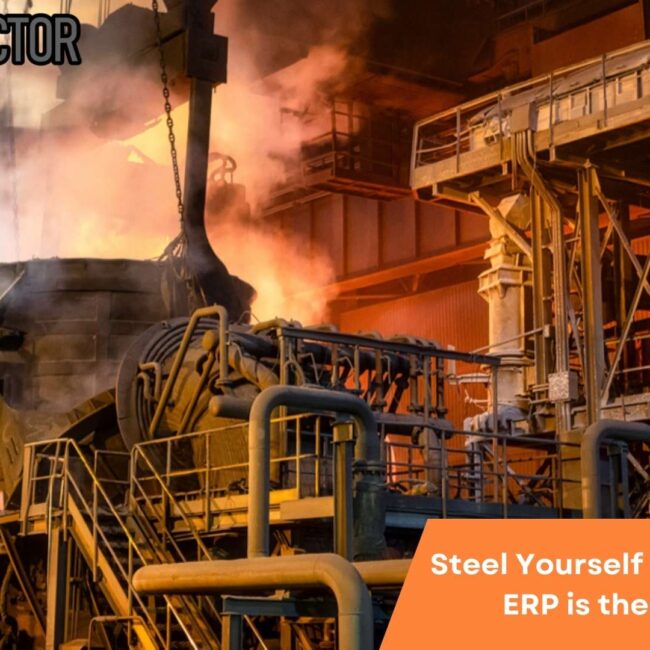
ERP: The Power Tool Your Machinery Business Needs!

Why ERP is the Secret Weapon for Machinery Manufacturing Success
The manufacture of machinery industry sits at the core of industrial progress, enabling the production of everything from automotive components and heavy machinery to precision tools and automated equipment. As one of the most complex and capital-intensive sectors, machinery manufacturing demands high levels of accuracy, efficiency, and coordination to meet the growing market demands.
However, the machinery manufacturing industry is also one of the most challenging. Fluctuating material costs, unpredictable supply chains, labor shortages, and growing customer expectations are creating pressure on manufacturers to improve operational efficiency and reduce costs without compromising quality.
To thrive in this environment, manufacturers need more than just traditional business management tools — they need a strategic solution that integrates every part of their operations into one seamless system. This is where ERP (Enterprise Resource Planning) comes in as the ultimate power tool for machinery manufacturing.
ERP systems are designed to provide end-to-end visibility and control over every aspect of a manufacturing business — from production scheduling and supply chain management to sales, customer service, and financial reporting. With real-time insights, automated workflows, and data-driven decision-making, ERP helps machinery manufacturers streamline operations, reduce waste, and maximize profitability.
In this blog, we’ll explore why ERP is the future of machinery manufacturing, how it addresses the industry’s biggest challenges, and why it’s becoming essential for competitive success.
The Challenges Facing the Machinery Manufacturing Industry
The manufacture of machinery industry operates in a high-stakes environment where precision, cost control, and supply chain efficiency are critical to success. Yet many manufacturers are still struggling with legacy systems, manual workflows, and disconnected data. This leads to inefficiencies, increased costs, and missed business opportunities.
🚨 1. Complex and Lengthy Production Cycles
Manufacturing machinery involves intricate production cycles that require precise coordination between multiple departments — from design and prototyping to machining, assembly, and quality control. A single breakdown or misalignment in the production process can delay the entire workflow and increase costs.
Example: A manufacturer producing automotive components might face a production halt due to incorrect part specifications or machine downtime, leading to delivery delays and financial losses.
🚨 2. Supply Chain Volatility and Raw Material Shortages
Machinery manufacturers are highly dependent on global supply chains for raw materials like metals, plastics, and electronic components. Political tensions, shipping disruptions, and material shortages can halt production and increase costs.
Without a centralized system to monitor supply chain performance and adjust procurement strategies, manufacturers face production bottlenecks and increased lead times.
🚨 3. Rising Labor and Energy Costs
Labor shortages, increased wages, and rising energy costs are putting additional pressure on profit margins. Manufacturers need to optimize machine utilization, reduce waste, and automate labor-intensive tasks to maintain profitability.
🚨 4. Inefficient Inventory Management
Poor inventory management can lead to overstocking or understocking of raw materials and finished goods. Overstocking increases holding costs and reduces cash flow, while understocking can lead to production delays and missed customer deadlines.
🚨 5. Regulatory and Compliance Issues
The machinery manufacturing sector is subject to strict industry standards and compliance requirements. Managing quality control documentation, safety standards, and product certifications manually increases the risk of non-compliance and penalties.
🚨 6. Data Silos and Lack of Real-Time Insights
Many manufacturers still rely on separate systems for sales, production, inventory, and finance. This creates data silos, making it difficult to get a real-time view of business performance and make strategic decisions.
How ERP Transforms the Machinery Manufacturing Industry
ERP systems address these challenges by providing an integrated platform where manufacturers can manage all their business processes from a single interface. ERP connects departments, automates workflows, and provides real-time data insights to help manufacturers improve efficiency, reduce costs, and enhance product quality.
1. Production Planning and Scheduling – Eliminate Bottlenecks
Manufacturing machinery requires detailed production scheduling and resource allocation. ERP systems automate and optimize production schedules to maximize efficiency and reduce lead times.
✅ Automated Work Orders: ERP generates work orders based on real-time sales data and production capacity.
✅ Machine Scheduling: Allocate machine time based on availability and production priority.
✅ Resource Allocation: ERP assigns labor and material resources dynamically to avoid bottlenecks.
✅ Capacity Planning: Adjust production schedules based on demand and material availability.
✅ Real-Time Monitoring: Monitor production progress and address issues immediately.
Example: A machinery manufacturer reduced production downtime by 20% after implementing an ERP-based scheduling system.
2. Streamlined Inventory Management – Reduce Waste and Improve Stock Accuracy
ERP systems provide real-time visibility into inventory levels, stock movements, and warehouse organization, helping manufacturers avoid overstocking and understocking.
📦 Stock Tracking: Monitor raw material and finished goods stock levels across multiple warehouses.
📦 Automated Replenishment: Generate purchase orders automatically when stock levels drop.
📦 Warehouse Optimization: Improve warehouse organization and reduce storage costs.
📦 Batch and Serial Number Tracking: Ensure full traceability of components and finished products.
📦 Inventory Forecasting: Use historical data to predict stock requirements and adjust inventory levels accordingly.
Example: A machinery manufacturer reduced inventory holding costs by 18% and improved order accuracy by 25% using an ERP-driven inventory system.
3. Supplier and Procurement Management – Improve Supply Chain Resilience
ERP systems integrate with supplier networks to provide better visibility and faster response times in the event of supply chain disruptions.
🚚 Supplier Performance Tracking: Monitor supplier reliability, delivery times, and material quality.
🚚 Automated Purchase Orders: Generate purchase orders automatically based on inventory levels and production schedules.
🚚 Alternative Sourcing: Identify backup suppliers to prevent production delays.
🚚 Cost Analysis: Track material costs and adjust pricing strategies accordingly.
🚚 Logistics Management: Track shipments and automate customs documentation.
Example: A machinery manufacturer reduced supply chain disruptions by 30% after implementing an ERP-based supplier management system.
4. Quality Control and Compliance – Reduce Defects and Improve Product Consistency
ERP systems automate quality checks and track product compliance to improve product consistency and reduce recalls.
🔍 Automated Inspections: Perform quality checks at each stage of production.
🔍 Non-Conformance Reporting: Flag defective products and initiate corrective action.
🔍 Traceability: Track components and finished products by batch or serial number.
🔍 Audit and Certification: Maintain records of compliance with ISO and industry standards.
Example: A machinery manufacturer reduced product defects by 25% using ERP’s automated quality control features.
5. Financial Management – Improve Profitability and Cash Flow
ERP systems provide real-time financial data and automated reporting to help manufacturers control costs and maximize profitability.
💰 Expense Tracking: Monitor labor, material, and operational costs in real-time.
💰 Profitability Analysis: Identify high-margin products and adjust pricing strategies.
💰 Budgeting and Forecasting: Generate financial forecasts based on production performance.
💰 Accounts Payable and Receivable: Automate invoicing and payment tracking.
Example: A machinery manufacturer increased profitability by 12% after switching to an ERP-based financial management system.
6. Sales and Customer Management – Increase Customer Satisfaction
ERP systems integrate sales and customer service processes to improve customer satisfaction and increase repeat business.
👥 Order Management: Centralize order processing and automate customer notifications.
👥 Customer Service: Manage customer inquiries, complaints, and feedback.
👥 Sales Forecasting: Predict sales trends and adjust production schedules accordingly.
👥 Customized Reporting: Provide customers with detailed product specs and tracking information.
Example: A machinery manufacturer increased customer satisfaction scores by 15% using ERP-driven sales and customer service tools.
FAQs
1. How does ERP improve production efficiency in machinery manufacturing?
ERP automates production scheduling and resource allocation, reducing downtime and improving output.
2. Can ERP handle multi-location manufacturing?
Yes, ERP allows manufacturers to manage production across multiple locations from a single platform.
3. How does ERP improve supplier relationships?
ERP tracks supplier performance and automates order processing to improve reliability.
4. Can ERP help manage custom machinery orders?
Yes, ERP supports custom production and unique customer specifications.
5. How does ERP improve inventory accuracy?
ERP provides real-time stock tracking and automated replenishment.
6. How does ERP reduce production downtime?
ERP schedules maintenance, tracks machine performance, and predicts failures.
7. How does ERP help with product quality control?
ERP automates quality checks and tracks product compliance.
8. Can ERP handle multi-currency transactions?
Yes, ERP supports multi-currency and multi-language operations.
9. How does ERP improve financial reporting?
ERP provides real-time financial reports and automates invoicing.
10. Does ERP support demand forecasting?
Yes, ERP predicts demand using historical data and market trends.
ERP is not just a tool — it’s a strategic solution for modern machinery manufacturers.





